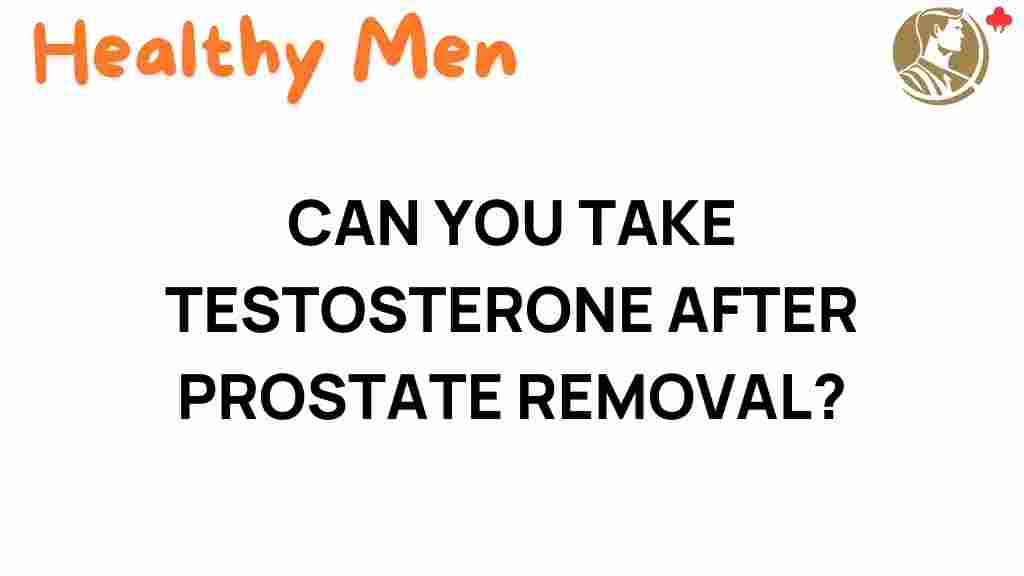The Controversial Question: Can You Take Testosterone After Prostate Removal?
After undergoing prostate removal surgery, many men face a challenging and often controversial decision regarding the use of testosterone therapy. Testosterone plays a crucial role in men’s health, impacting everything from mood to muscle mass. However, the connection between testosterone and prostate health has sparked significant debate among medical professionals. This article will explore the implications of testosterone therapy following prostate removal, particularly in the context of post-surgery recovery, prostate cancer, and the latest medical guidelines.
Understanding Prostate Removal and Its Impact
Prostate removal, or prostatectomy, is a common surgical treatment for prostate cancer. The surgery involves the complete or partial removal of the prostate gland, which can have significant effects on a man’s hormonal balance, sexual function, and overall well-being.
The Role of Testosterone in Men’s Health
Testosterone is often referred to as the primary male sex hormone. It plays a vital role in various bodily functions, including:
- Regulating libido and sexual function
- Maintaining muscle mass and bone density
- Influencing mood and mental health
- Supporting metabolic processes
After prostate removal, testosterone levels can drop significantly, leading to symptoms such as fatigue, depression, and decreased libido. This brings up the question of whether testosterone replacement therapy (TRT) is a viable option for men post-surgery.
The Controversy Surrounding Testosterone Therapy
The use of testosterone therapy after prostate removal is contentious for several reasons:
- Prostate Cancer Risk: Some studies suggest that testosterone can stimulate the growth of prostate cancer cells. This concern is particularly acute for men who have recently undergone prostate removal due to cancer.
- Individual Variation: Each patient’s situation is unique. Factors such as the stage of cancer, the extent of surgery, and individual health profiles significantly influence the decision to start testosterone therapy.
- Medical Guidelines: Current medical guidelines vary in their recommendations regarding testosterone therapy after prostatectomy. Some emphasize caution, while others advocate for careful monitoring and individualized treatment plans.
Medical Guidelines for Testosterone Therapy
According to various urology associations, the consensus on testosterone therapy post-prostate removal is still evolving. Here are some key points from recent guidelines:
- Testosterone therapy should not be initiated in men with active prostate cancer or those with a history of aggressive cancer.
- For men with low testosterone levels after prostate surgery, a thorough evaluation is essential to assess the risks and benefits of therapy.
- Regular monitoring of prostate-specific antigen (PSA) levels is crucial during testosterone therapy to detect any potential cancer recurrence.
Evaluating Your Candidacy for Testosterone Therapy
If you are considering testosterone therapy after prostate removal, it is vital to evaluate your candidacy thoroughly. Here is a step-by-step process to guide you:
Step 1: Consult Your Urologist
Start by discussing your concerns and symptoms with your urologist. They will consider your medical history, the specifics of your prostate cancer, and your current hormonal levels.
Step 2: Get Tested
Your healthcare provider will likely recommend tests to measure your testosterone levels and assess your overall health. Common tests include:
- Serum testosterone levels
- PSA levels
- Complete blood count (CBC)
Step 3: Assess Symptoms
Discuss any symptoms you are experiencing that could be related to low testosterone, such as:
- Fatigue or low energy
- Decreased libido
- Loss of muscle mass
- Depression or mood changes
Step 4: Weigh the Risks and Benefits
Your doctor will help you weigh the potential benefits of testosterone therapy against the risks, particularly concerning prostate cancer recurrence. This will often involve a thorough discussion of your personal health goals and preferences.
Step 5: Make an Informed Decision
After careful consideration, you and your healthcare provider can make an informed decision regarding whether to pursue testosterone therapy.
Possible Side Effects of Testosterone Therapy
While testosterone therapy can provide significant benefits, it also comes with potential side effects, including:
- Increased risk of blood clots
- Worsening of sleep apnea
- Acne or skin reactions
- Increased red blood cell count
It is essential to monitor these side effects closely and maintain regular follow-up appointments with your healthcare provider.
Troubleshooting Common Issues with Testosterone Therapy
Many men experience challenges when beginning testosterone therapy. Here are some common issues and troubleshooting tips:
Issue 1: Adjustment Period
Some men may experience mood swings or irritability during the initial phase of testosterone therapy. This adjustment period is typically temporary. If symptoms persist, consult your doctor.
Issue 2: Monitoring PSA Levels
Regular monitoring of PSA levels is critical. If your PSA levels rise significantly, your healthcare provider may need to reassess your treatment plan.
Issue 3: Finding the Right Dosage
It may take time to find the optimal testosterone dosage. Work closely with your healthcare provider to adjust your dosage based on your symptoms and lab results.
Conclusion
Deciding to take testosterone after prostate removal is a nuanced and personal decision that should be made in consultation with a qualified healthcare provider. Understanding the risks and benefits of testosterone therapy is crucial for maintaining men’s health and ensuring a successful post-surgery recovery.
For men who have undergone prostate removal, testosterone therapy can offer significant benefits when used appropriately. By following medical guidelines and engaging in open communication with your urologist, you can make informed choices about your hormone therapy journey.
If you are interested in learning more about testosterone therapy and its implications after prostate surgery, consider visiting this resource for more detailed information.
For additional support and information on men’s health topics, check out our men’s health articles.
This article is in the category Conditions and created by healthymen Team
